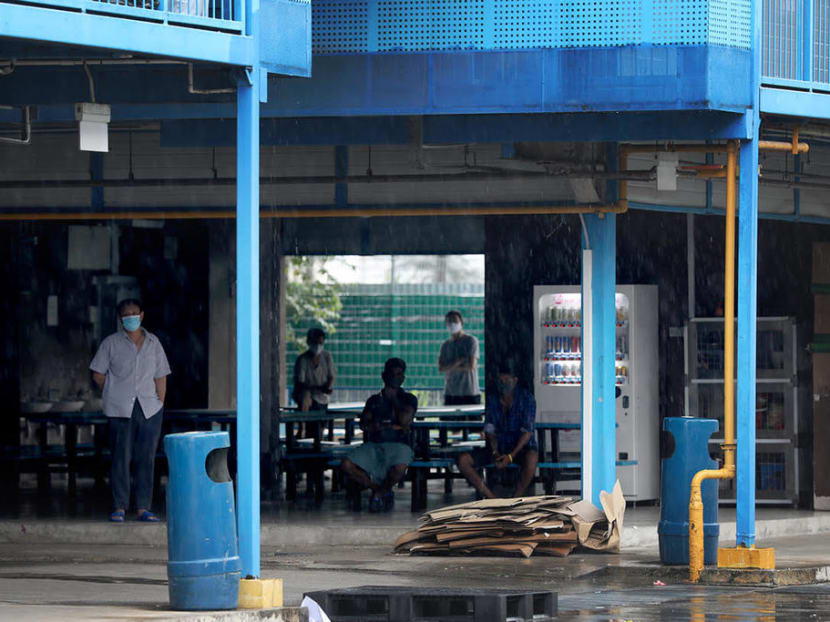Covid-19: Migrant workers to be allowed back into community once a month in pilot scheme in early 2021
SINGAPORE — As Singapore enters the final phase of reopening its economy after a partial lockdown earlier in the year, it will relax movement restrictions on migrant workers, including allowing them to be among the community once a month. This will be subject to Covid-19 testing, under a pilot scheme in the first three months of next year.

Foreign workers living in dormitories will still be subjected to routine testing for Covid-19 and they still have to wear their contact-tracing devices called BluePass tokens.
SINGAPORE — As Singapore enters the final phase of reopening its economy after a partial lockdown earlier in the year, it will relax movement restrictions on migrant workers, including allowing them to be among the community once a month. This will be subject to Covid-19 testing, under a pilot scheme in the first three months of next year.
Speaking at a press conference on Monday (Dec 14) held by the governmental task force addressing Singapore’s response to Covid-19, Second Minister for Manpower Tan See Leng also said that migrant workers will be allowed to visit one of the eight designated recreation centres more often for their daily needs, such as going to the barber or making remittances.
The Government is working with the recreation centres to add more activities, including setting up beer gardens and movie screenings, Dr Tan said.
The workers will also have access to communal facilities in their dormitories such as cooking stations and sports facilities, he added.
However, alongside the easing of these restrictions, Dr Tan said that foreign workers living in dormitories will still be subjected to routine testing for Covid-19, and they still have to wear their contact-tracing devices, called BluePass tokens.
This applies to migrant workers employed in the construction, marine and process sectors, he added.
By the end of this month, the Government will complete distributing contact-tracing devices to more than 450,000 workers living in dormitories, or working in the construction, marine and process industries.
Dr Tan said: “Covid-19 will remain a threat for some time. The risk of transmission, especially from those with no or mild symptoms, remains.
“The fight against the re-emergence of Covid-19 in the dormitories is the shared responsibility of migrant workers, employers, dormitory operators and the Government.”
In response to TODAY's queries on whether the migrant workers will be restricted to particular areas, and whether there will be limits on the number of workers who can make such visits at any one time, the Ministry of Manpower (MOM) said it still developing the details of the pilot.
In a factsheet sent to the media by MOM and the Health Ministry, they said that they are monitoring the earliest cohort of migrant workers who have recovered from Covid-19 and are currently exempted from routine testing.
"We are studying how their antibodies change over time," the ministries said. "We will resume (routine testing) for these workers if we detect their antibodies starting to fade, or if there is evidence of re-infection among them."
As at Dec 13, 54,505 dormitory residents have tested positive using the polymerase chain reaction test.
Another 98,289 have tested serology-positive though they did not have a positive test.
With 323,000 workers staying in dormitories, it means the prevalence rate of Covid-19 in dormitories is 47 per cent.
Migrant workers in Singapore have been placed under strict lockdown since April, and were not allowed to leave their dormitories, except on a limited basis.
At that time, the vast majority of Singapore’s coronavirus infections were among the migrant worker community living in purpose-built dormitories, casting the spotlight on the packed and unsanitary living conditions in these accommodations.
After the cases came down drastically, migrant workers were allowed to leave dormitories in August, but only to go to designated recreation centres for their daily needs as part of a trial.
Only those who tested negative for Covid-19 or had demonstrated immunity after recovering from the disease are eligible to leave. They also have to book an exit pass via a mobile application before they could leave.
The upcoming pilot announced by Dr Tan will be the first time migrant workers will be able to head to other parts of Singapore, apart from the recreation centres, since April.
Dr Tan said that “great strides” have been made in curbing the Covid-19 infection among the migrant worker community since the first case was detected in March.
“The situation at the dormitories has stabilised since the dormitories were cleared, with workers returning to work and able to take part in rest-day activities.”
Through a comprehensive testing regime and safe-distancing measures at dormitories, the surge in Covid-19 infections among the community had come under control, he added.
This had been possible with the efforts of various groups such as dormitory operators, employers, non-governmental organisations, government agencies and the foreign workers themselves.
However, he stressed that the fight is not over.
“I think we have just reached base camp. The weeks, the months ahead, as we gradually ease these restrictions, we have to recognise that the crisis is far from over.
“We still have to scale the peak in terms of ensuring that as we open up safely, we will continue to have to implement a robust and an inclusive regime of vaccinations and regular testing for all of our migrant workers,” he said.











